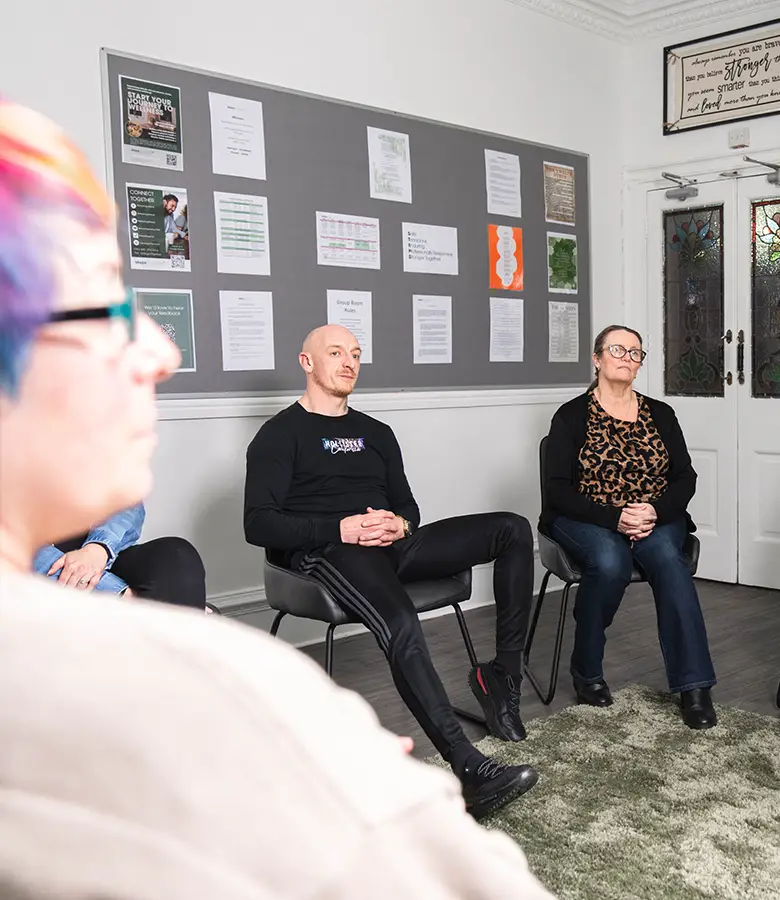
Blue Monday: Why the Toughest Days Can Be the Start of Real Change
January can feel heavy. The festive energy has faded, routines are back in full swing, and the long stretch of






Outpatient rehab is a type of treatment where you receive care and support for alcohol or drug addiction while continuing to live at home. You attend group and individual therapy sessions at a clinic or rehab centre, allowing you to manage your recovery around work, school, or family commitments. This makes outpatient rehab a flexible option for those who want to maintain their daily routines while prioritising their health.
If you are looking for a way to start your recovery journey from drug or alcohol addiction without stepping away from your life, outpatient rehab can be an effective option. It usually involves therapy, counselling, and educational programmes to help you make real progress and avoid relapse. Understanding the basics of outpatient rehabilitation can help you determine if it meets your needs.

Steps Together offers personalised support and proven treatments, providing the care, guidance and encouragement you need to move forward with confidence and build a healthier future.

Outpatient rehab provides structured addiction treatment while allowing you to remain at home. Instead of living in a facility, you travel to scheduled sessions where you receive therapy, counselling, and ongoing support.
Outpatient care can be especially helpful if inpatient treatment isn’t accessible or if your situation doesn’t require 24/7 supervision. It creates a pathway to recovery that is practical and adaptable to your everyday routine.
Outpatient rehab is a structured programme where you attend regular sessions for therapy, education, and support, but you return home afterwards. These sessions can include individual counselling, group therapy, and even family gatherings.
A key goal is to help you develop skills to cope, recover, and prevent relapse while continuing to manage your everyday life. Most outpatient services offer a planned schedule, so you know when and where your sessions will take place. The flexible approach means you can continue your normal routines while still focusing on your recovery.


Unlike inpatient rehab, an outpatient programme does not require an overnight stay at a facility. Instead, you visit for treatment sessions and then return home. This reduces costs, as you do not pay for room and board, making outpatient rehab more accessible for many people.
Inpatient programmes often involve a strict daily schedule and a controlled environment where you are separated from daily triggers. Outpatient rehab allows you to address real-life challenges while receiving support, enabling you to practise coping skills in your own environment.
Outpatient rehab offers a treatment approach that allows you to receive care while continuing your daily activities. This type of care is often more convenient for many people, letting you keep up with work, school, and family.
Flexibility is one of the biggest differences between inpatient and outpatient rehab. You can schedule sessions around your job, school, or family commitments, rather than pausing your entire life. Many clinics offer day, evening, and weekend appointments to accommodate different schedules.
This flexibility makes it easier for you to attend treatment consistently, which can improve your chances of recovery. The ability to live at home and be close to your support network also boosts emotional stability and motivation.
Another distinction between inpatient and outpatient rehab is that it is usually more affordable than staying in a rehab facility. Since you do not pay for room, meals, and 24/7 care, the overall cost is lower. This can make treatment more accessible, especially for those with limited financial resources.
Some intensive outpatient programme services may still be costly, but the cost is almost always less than that of inpatient care. You also avoid the added expense and disruption of lost wages or extra travel.
Outpatient alcohol and drug addiction treatment lets you continue meeting your personal and professional obligations. You do not have to leave work, take time off from school, or arrange long-term childcare while in drug and alcohol rehab treatment.
This means you can keep your routines, which is important for many people’s mental health and recovery process. You remain connected to your family, friends, and community while working on improving your health.
Inpatient rehab takes place in a controlled environment. Outpatient rehab encourages the real-life application of coping strategies by allowing you to practice what you learn in therapy in your everyday environment. Instead of being removed from daily challenges, you stay engaged with your responsibilities while developing healthier habits and responses.
This real-time practice helps reinforce skills such as stress management, emotional regulation, and avoiding triggers. Applying strategies immediately can often lead to better long-term results and a stronger sense of confidence in your recovery journey.

Outpatient rehab gives you the chance to receive treatment and support while continuing to live at home. Instead of staying in a facility, you’ll attend scheduled therapy sessions, medical appointments, or support groups that are structured around your daily responsibilities. This approach makes recovery more flexible and accessible, especially if you’re balancing work, family, or school.
In these sessions, you may take part in individual counselling, group therapy, educational workshops, or medication management, depending on your needs. The goal is to provide consistent guidance and tools that help you manage cravings, develop healthier coping strategies, and make steady progress toward long-term recovery.

Individual counselling provides you with private time to explore personal struggles and goals with a licensed therapist. Sessions focus on identifying triggers and learning ways to manage cravings. A Treatment provider may use methods like cognitive behavioural therapy (CBT) to help you change negative thinking patterns.
Group therapy enables you to connect with others who face similar challenges in a supportive setting. Sessions are led by a trained therapist who encourages open sharing. You learn from others’ experiences and receive feedback on your struggles, and having others to share with helps you feel less isolated during recovery.
Medication-assisted treatment (MAT) combines medication with therapy to reduce cravings and withdrawal symptoms. Medicines such as naltrexone, buprenorphine, or methadone may be used depending on the addiction. Healthcare professionals monitor these treatments.
Staying with outpatient rehab comes with unique challenges. These range from handling temptation in your daily environment to managing schedules and finding the right support nearby.
Outpatient rehab means you return home after each session. This gives you more exposure to old places, people, and triggers that can lead to relapse. It is common to face temptation from friends or social settings where drugs or alcohol are present.
You need to build strong coping skills to handle cravings or pressure. Many programmes teach strategies such as avoiding risky places, setting boundaries, and practising mindfulness. Relapse is not a failure, but rather a sign that you may need more support or a change in your approach. Honest communication with your care team is crucial. If you feel close to relapse, let them know so your plan can be adjusted quickly.
You do not have 24/7 support in outpatient rehab. This makes it vital to build a strong support network outside your formal treatment. Support can come from family, friends, peer groups, or community services.
Consider joining a support group or attending counselling outside of regular rehab hours. Many people benefit from Alcoholics Anonymous (AA), Narcotics Anonymous (NA), or other meetings. Support groups provide a space to share struggles, find encouragement, and learn from others.
Unlike inpatient rehab, outpatient rehab requires you to manage your daily routine alongside treatment. This means you may need to coordinate work, school, childcare, and other commitments with your rehab appointments.
Key challenges include making time for therapy, managing responsibilities, and coping with fatigue or emotional stress. Some clinics offer evening or weekend sessions to help fit treatment around your schedule. However, it is up to you to stay organised and prioritise therapy. You may need to ask for support from family or employers during this time.

January can feel heavy. The festive energy has faded, routines are back in full swing, and the long stretch of

Christmas is a time of warmth and joy, yet it can also be a challenging time for families supporting someone

As the year draws to a close, it is tempting to think, “I’ll start again in January.” We tell ourselves

Talking about mental health can feel challenging. If you’ve ever been told to “man up,” “act like a real man,”

Last week, we gathered at Aintree Racecourse for a night that truly embodied what Steps Together stands for. The SHINE

Every year, World Mental Health Day reminds us that our wellbeing is inseparable from the environments where we live and

Outpatient rehab gives you structure and support without putting your life on hold. With a clear process and a treatment plan tailored to your needs, you can continue your daily routines while making meaningful progress toward recovery.
At Steps Together, we understand that everyone’s journey is different. That’s why we provide flexible options designed to meet you where you are, giving you or your loved one the care, guidance, and encouragement needed to achieve lasting recovery.
During your first visit, staff will ask questions about your health history, substance use, and personal goals. This assessment helps create a plan tailored to your specific situation. Some centres may offer this evaluation free of charge, but it may also incur a fee, depending on the facility.
Many outpatient rehab programmes offer one-on-one counselling, group therapy, and educational sessions. You may have access to therapies such as cognitive behavioural therapy, motivational interviewing, or family counselling. The mix of therapies depends on your needs and the facility’s approach.
Some programmes encourage your family to be involved through group meetings or family counselling sessions. This can help build support at home and improve communication. family therapy often varies depending on your personal needs.
Outpatient rehab lets you attend sessions while still living at home. This is different from inpatient treatment, which requires you to stay at the facility throughout your programme. Outpatient care often works well if you need flexibility with your daily life and responsibilities.
Most outpatient rehab programmes last from a few weeks to several months. The exact length of your treatment will depend on your progress and individual goals. Programmes may offer sessions multiple times a week for consistent support.
Outpatient rehab can cost anywhere from £1,000 for a basic programme to over £3,000 for a more complete plan, depending on the clinic you choose and the length of treatment. Some centres offer payment plans or sliding scale fees, and certain services may be covered by health insurance or local support programmes.